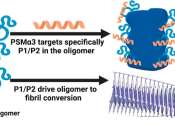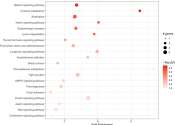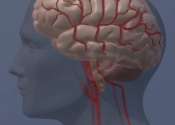Last update:
Parkinson's & Movement disorders news
Parkinson's & Movement disorders
Focused ultrasound machine can stop Parkinson's tremors
Delray Medical Center cut the ribbon on its newest high-tech machine last week that targets brain areas to treat movement disorders such as essential tremor and tremor-dominant Parkinson's disease.
4 hours ago
0
4
Blood immune cells could hold key to showing disease progression in Parkinson's
A new discovery in blood immune cells has put researchers one step closer to identifying a blood biomarker that would allow doctors to personalize treatments for Parkinson's disease.
Jan 9, 2025
0
35

Computer simulations detail 'protein clumps' linked to Huntington's disease
University of Bergen researcher Markus Miettinen is among the first scientists to provide a detailed description of protein clumps associated with Huntington's disease. The findings, which could pave the way for new diagnostic ...
Jan 7, 2025
0
37

Novel approach pinpoints genetic variants linked to Parkinson's disease risk
Investigators have developed a novel approach that can better identify and characterize genetic variant interactions associated with increased risk of Parkinson's disease, improving the understanding of the genetic heritability ...
Jan 6, 2025
0
23

Brain study challenges long-held views about Parkinson's movement disorders
University of Arizona researchers have revealed new insights into one of the most common complications faced by Parkinson's disease patients: uncontrollable movements that develop after years of treatment.
Jan 3, 2025
0
118

Clinical trial shows propranolol reduces tremors in Parkinson's disease
The standard medication levodopa does not always work against tremors in Parkinson's disease, especially in stressful situations. Propranolol, however, does work during stress, providing insight into the role of the stress ...
Dec 23, 2024
0
70

Discovery of cilia defects in ALS patients suggests new treatment path
Amyotrophic lateral sclerosis (ALS) is a devastating neurodegenerative disease that affects motor neurons. The average life span after diagnosis of this incurable disease is two to five years.
Dec 20, 2024
0
13

'Dancing the blues away' seen in brain imaging in people with Parkinson's disease
Dancing lowers the depression associated with Parkinson's disease, and the benefits can be seen in multiple ways, according to a study involving York University researchers published in the Journal of Medical Internet Research.
Dec 16, 2024
0
0

Emotional cognition analysis enables near-perfect Parkinson's detection
A joint research team from the University of Canberra and Kuwait College of Science and Technology has achieved groundbreaking detection of Parkinson's disease with near-perfect accuracy, simply by analyzing brain responses ...
Dec 16, 2024
0
0

Receptor structure reveals novel drug design opportunities for Parkinson's disease
University of Southern California-led researchers have discovered the structural details of a brain receptor called GPR6, which could lead to new treatments for Parkinson's disease.

Wearable devices can help predict 5-year risk of falls for people with Parkinson's disease
A new study from the University of Oxford demonstrates how clinicians could use data to predict the risk of falls in people with Parkinson's disease (PD) to help improve effective longer term care planning.
Dec 5, 2024
0
2

Research reveals possible link between protein G3BP1 and amyotrophic lateral sclerosis
Researchers from the Structural Biology Brussels group at Vrije Universiteit Brussel (VUB) have uncovered a significant mechanism that may contribute to amyotrophic lateral sclerosis (ALS), a disease that causes muscle weakness ...
Dec 5, 2024
0
0

Common heart drug may slow progression of Huntington's disease
A common heart drug may slow the progression of Huntington's disease (HD), according to a new study by University of Iowa Health Care researchers.
Dec 2, 2024
0
141

Chemical tag to investigate 'disordered' proteins sheds new light on Parkinson's research
Scientists at La Trobe University have created a world-first method to investigate "disordered" proteins in living cells, in research that could change how we understand and treat Parkinson's disease.
Nov 26, 2024
0
27

New biomarkers could improve diagnosis and tracking of Parkinson's disease and Lewy body dementia
Investigators led by Tanya Simuni, MD, the Arthur C. Nielsen, Jr., Research Professor of Parkinson's Disease and Movement Disorders, have defined new biologic and clinical biomarkers for better identifying patients with different ...
Nov 26, 2024
0
68

Digital therapeutics can improve Parkinson's control, study finds
The use of PD Neurotechnology's pioneering telemonitoring device to assess Parkinson's Disease (PD) symptoms and inform medication adjustments led to the majority of patients exhibiting improved or stable symptom manifestation, ...
Nov 26, 2024
0
2

Network theory insights lead to a mathematical representation of Parkinson's disease
Neurodegenerative diseases, such as Parkinson's disease, can be thought of as arising from malfunctions in the network of neuronal agglomerates in the brain. It is therefore often useful to apply insights from a branch of ...
Nov 22, 2024
0
1

Parkinson's drug changes the gut microbiome for the worse due to iron deficiency, study reveals
A new study has revealed that the widely prescribed Parkinson's disease drug entacapone significantly disrupts the human gut microbiome by inducing iron deficiency.
Nov 21, 2024
0
47

Algorithm can identify subtle changes in a person's voice for early Parkinson's detection
Algorithms that can detect subtle changes in a person's voice are emerging as a potential new diagnostic tool for Parkinson's disease, according to researchers from Iraq and Australia.
Nov 21, 2024
0
1

Deep brain stimulation: A promising future for anxiety in Parkinson's patients
Deep brain stimulation has revealed that a specific type of brain wave activity is associated with levels of anxiety in people living with Parkinson's disease, according to research led by scientists at City St George's and ...
Nov 20, 2024
0
2

PNA5 protein shows potential for treating Parkinson's-related cognitive decline and dementia
A recently published study by researchers at the University of Arizona Health Sciences found that a tiny protein called PNA5 appears to have a protective effect on brain cells, which could lead to treatments for the cognitive ...
Nov 19, 2024
0
2

Reframing cerebral palsy as a lifelong physical disability could improve adult care, researchers say
In the United States, there are currently more adults living with cerebral palsy than children. Despite this, the Centers for Disease Control and Prevention still label cerebral palsy as "the most common motor disability ...
Nov 19, 2024
0
4

Parkinson's paradox: When more dopamine means more tremor
Researchers from the Champalimaud Foundation have shed light on the puzzling relationship between dopamine and rest tremor in Parkinson's disease, finding that preserved dopamine in certain brain regions may actually contribute ...
Nov 18, 2024
0
43

Researchers identify a potential biomarker of Parkinson's disease progression
A team of researchers from the University of Barcelona and the Bellvitge Biomedical Research Institute (IDIBELL) has identified a potential biomarker of Parkinson's disease progression. According to the study, published in ...
Nov 12, 2024
0
16












































